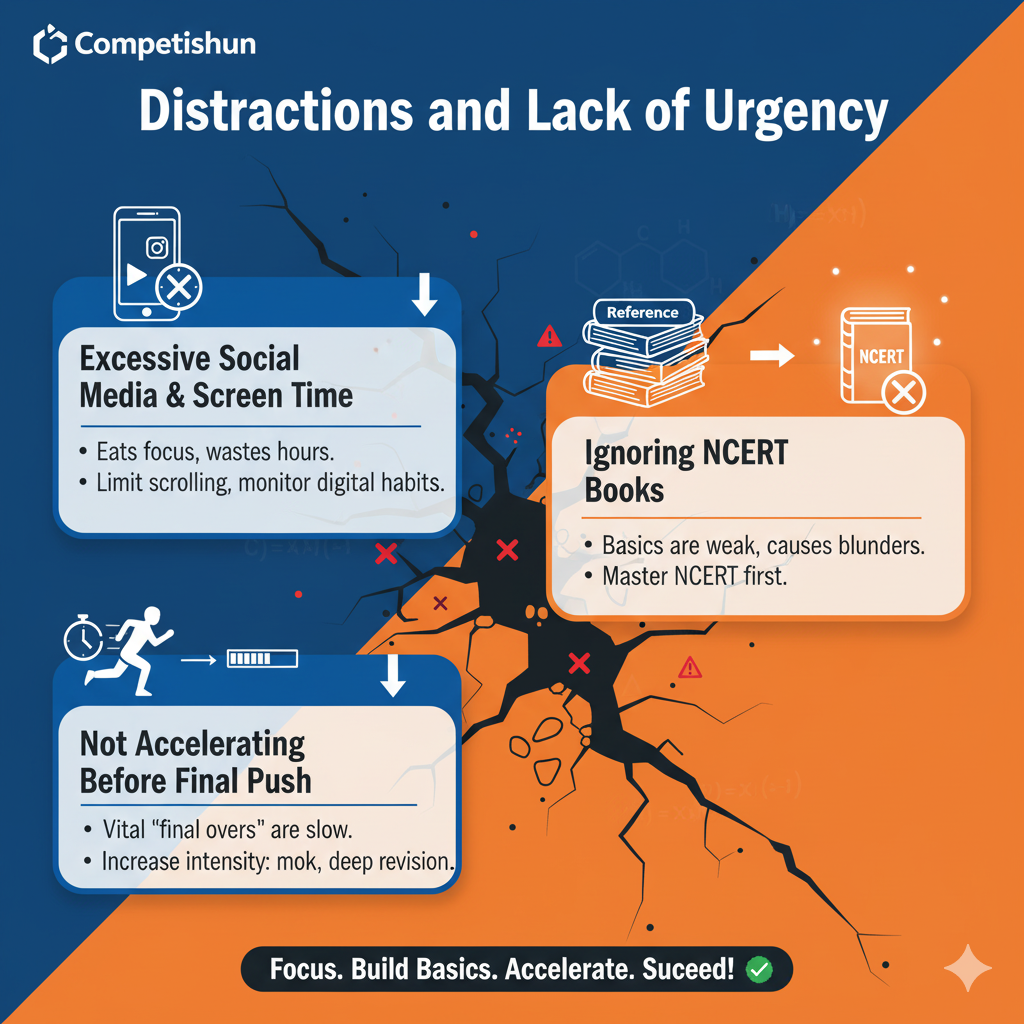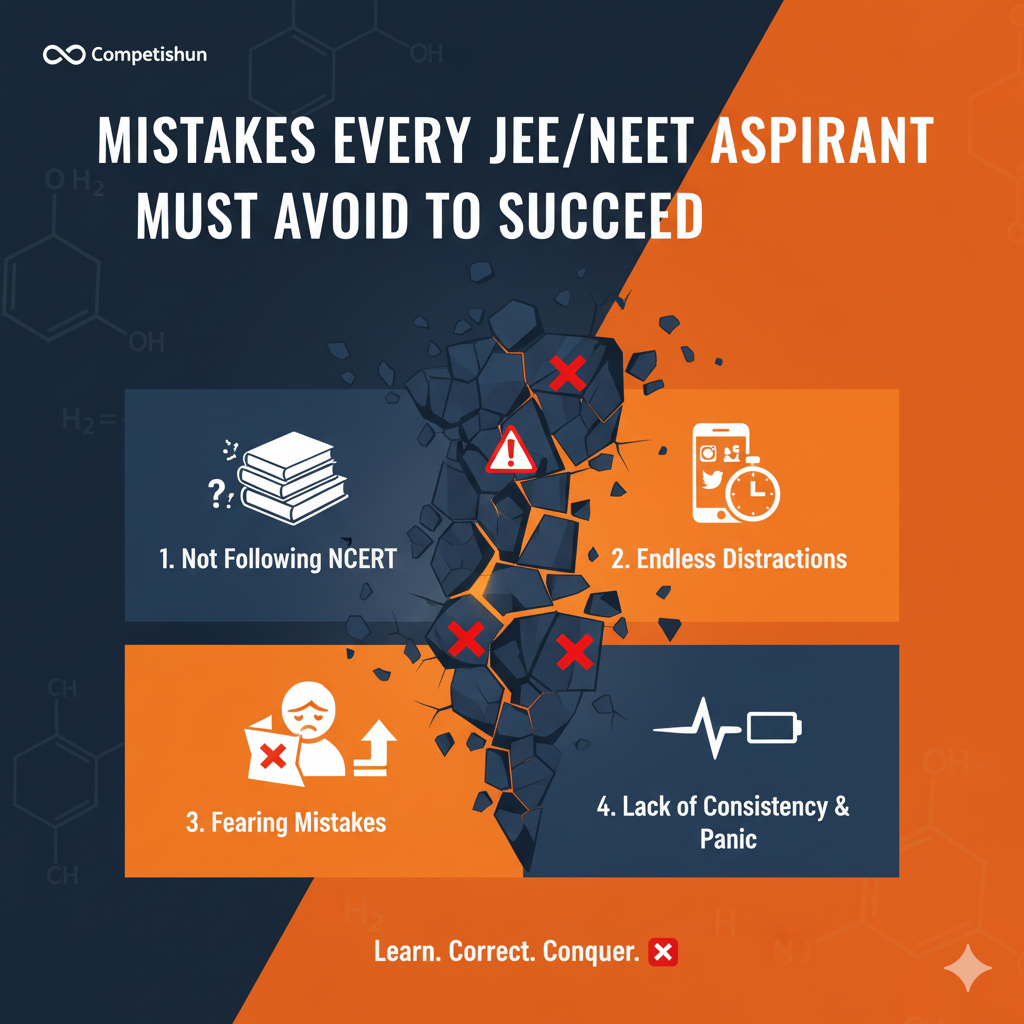Introduction: Why do most JEE/ NEET aspirants fail without realising it?
Did you ever feel like your JEE or NEET preparation was slipping out of your hands, even though you were working hard? You are not the only one? Thousands of aspirants begin with high hopes but end up far from their dream ranks. It is not due to your intellectual deficiency, but rather to small, avoidable mistakes that contribute to the massive setbacks.
This isn’t a list of success hacks; it’s your anti-failure guide. Spotting out the mistakes and fixing them early can save you from wasting months of effort and steer your journey toward your dream rank.
Foundation Failures, Misjudging the battle
Underestimating the exam’s toughness
Many toppers start their journey with confidence, only to realise later that JEE and NEET aren’t like any board exams. These tests require you to outpace hundreds of aspirants. Scoring 90% isn’t enough in JEE and NEET; you have to be in the top 1%. The sooner you respect the competition, the better you will prepare.

Practice Unresponsiveness: Learning without doing
Setting unrealistic expectations
Dreaming immensely is fine, but expecting instant perfection can be extremely dangerous. At the start, you might fail often, and that is fine. Remember, even JEE advanced cut-offs hover around 25-35%. What matters the most isn’t flawless performance but learning consistently.
Skipping the note-taking
If aspirants think watching lectures or reading PDFs is enough, think again. Writing might help your brain remember better. Taking notes acts as a quick revision guide before exams. Whether you are taking notes in class or online, always remember to summarise key perceptions in your own words.
Missing classes consistently
Many candidates switch between online and offline modes, blaming one of them for their poor results. The truth is not the mode; it’s the inconsistency of the students. Stick to your chosen format, attend regularly, and stop choosing shortcuts again and again.
Ignoring Doubts
Uncleared doubts are silent killers not only for JEE and NEET aspirants but also for any students who will appear for competitive exams. Leaving even a few questions unsolved can cause a big conceptual gap. Try to resolve them daily through books, mentors, peers, or any videos. Physics and maths always need instant clarity.

Practice Deficit: Failing to apply knowledge
The theory trap
Watching a lecture may feel productive, unless you solve them yourself, because without aspirants solving them themselves is hollow. Every concept must be tested through questions. Practice makes every topic your information sack full.
Accumulating Backlogs
Skipping through topics or ignoring missed classes creates mental clutter among the candidates. Backlog isn’t destiny, but it’s a delay. Dedicate 30 minutes daily to clear off the pending work and missed classes. Small and steady steps help a lot to win the marathon.
Neglecting Revision
Without revision, even strong topics fade. Revise on a weekly and monthly basis. Before every test, try reviewing your notes and error logs. Revision is not optional; it is how one can retain what they have earned.
Avoiding Mock tests and their analysis
Mock tests aren’t just a test to test the knowledge, they train your accuracy, stamina and timing. Taking them isn’t enough; analyse every paper and identify the patterns in your mistakes and fix them early.
Distractions and Lack of Urgency
Excessive Social Media and screen time
Every scroll on Instagram or any social media eats your focus for hours. Aspirants may think 10 minutes of scrolling over social media won’t matter, but add them up, and you have lost a few days. Keep your phone and other distracting devices away during study hours and monitor your digital habits.
Ignoring NCERT books
NEET aspirants should never skip NCERT textbooks, as they may cause blunders. Even JEE Main draws heavily from NCERT concepts. A fancy reference book would never help if the basics are weak. Master the NCERT books and then build on them.

Not accelerating before the final push
The last few months before exams are vital as they are your ‘final overs’. This is when one must increase intensity, like daily mocks, deeper revisions, and more study hours. Maintaining a similar slow pace will cost you bad ranks.
Mindset Mistakes: Perfection and Inflexible Goals
Seeking Perfection over Progress
Spending days perfecting a single topic means ignoring all the other important topics for your exam. The exam rewards overall progress, not a single perfect chapter. Focus on improving overall, not getting perfect. Move ahead with the 80% knowledge on a chapter and refine it later.
All or nothing thoughts
‘I want to get into IIT Kharagpur or nothing’, such a mindset may lead to burnout, panic, and frustration. Keep flexible goals. Even if you fall short, there are great institutes and career paths ahead. Success isn’t black or white; it’s a spectrum between.
Conclusion
Turn awareness into action. Be consistent, revise often, and analyze every mock; manage the other distractions. Don’t chase perfection, chase progress and be consistent about it. And dear parents, your role is very important. Understand the amount of pressure your child is going through, guide them with empathy, and avoid comparing them to others.

